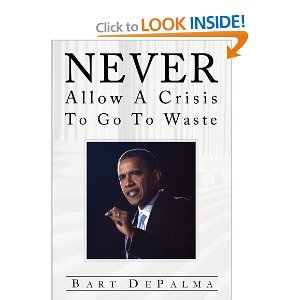
Bart DePalma
I received this book as a gift, along with Capitalism 101. Of the two I prefer this one.
On the positive side, both books represent a growing body of citizens who understand that big government is very much alike to central government, and both are forms of fascism / socialism that are bad for the majority.
On the negative side, neither book seems to appreciate the fact that the Republican Party is every bit as corrupt as the Democratic Party.
Being already predisposed to agree with the author on the fundamentals, I found the book interesting but disconnected from a great deal of what I have been working on, including transparency, truth, and trust. Both the Republican and Democratic parties are corrupt; both have been busy borrowing a trillion dollars a year in our name while seeking to regulate our lives into misery.
There is a place for limited government, and a vital role: keeping business honest. Trust lowers the cost of doing business. The two-party tyranny has corrupted America, turned America into The Cheating Culture: Why More Americans Are Doing Wrong to Get Ahead.
The books well researched with many interesting notes, and it has an index [the same is not true of Capitalism 101, which is more like a bunch of personal stories bundled together.]
Where I have a problem with books like this (agreeing with the author on the basics) is in the denial of the raw fact that the Republicans have done as much if not more than the Democrats to loot the Republic, they just work in a different way. It was a Republican, Senator Phil Gramm of Texas, who as banking chairman put in 200 pages of lobbyist written deregulation five minutes before the bill was to be voted on, and it was the other 99 Senators, from BOTH parties, who lacked the integrity to cry foul. It is the Republicans that started the practice of borrowing a trillion dollars a year so they could earmark their way to personal wealth at our expense, charging 5% for each allocation of the public's money to projects we do not need and cannot afford.
We live in a two-party tyranny, and the first thing my fellow lovers of liberty have to get a grip on is that BOTH the Republican AND the Democratic parties are corrupt, have sold us out, and cannot be trusted with the White House in 2012. One reason I am running for the presidential nomination within the Reform Party is because I have concluded that there is nothing wrong with America the Beautiful that cannot be fixed by flushing BOTH parties down the toilet, uniting the Independents, moderates from both parties, the Greens, Libertarians, Constitution, and others in a massive rebirth of a Republic that is Of, By, and For We the People.
So this book, and the Tea Party, are welcome voices, but both need to get a grip on reality: BOTH parties are corrupt, BOTH parties have enabled Wall Street corruption AND Welfare / Socialism corruption. I share the author's view that three fifths or more of the federal government should be shut down, and I advocate a balanced budget and true cost economics as a means of getting all of us back in harmony with reality and one another.
See other books I have reviewed:
The Broken Branch: How Congress Is Failing America and How to Get It Back on Track (Institutions of American Democracy)
Breach of Trust: How Washington Turns Outsiders Into Insiders
Running on Empty: How the Democratic and Republican Parties Are Bankrupting Our Future and What Americans Can Do About It
Grand Illusion: The Myth of Voter Choice in a Two-Party Tyranny
Griftopia: A Story of Bankers, Politicians, and the Most Audacious Power Grab in American History
The Two Trillion Dollar Meltdown: Easy Money, High Rollers, and the Great Credit Crash
Vice: Dick Cheney and the Hijacking of the American Presidency
Weapons of Mass Deception: The Uses of Propaganda in Bush's War on Iraq







